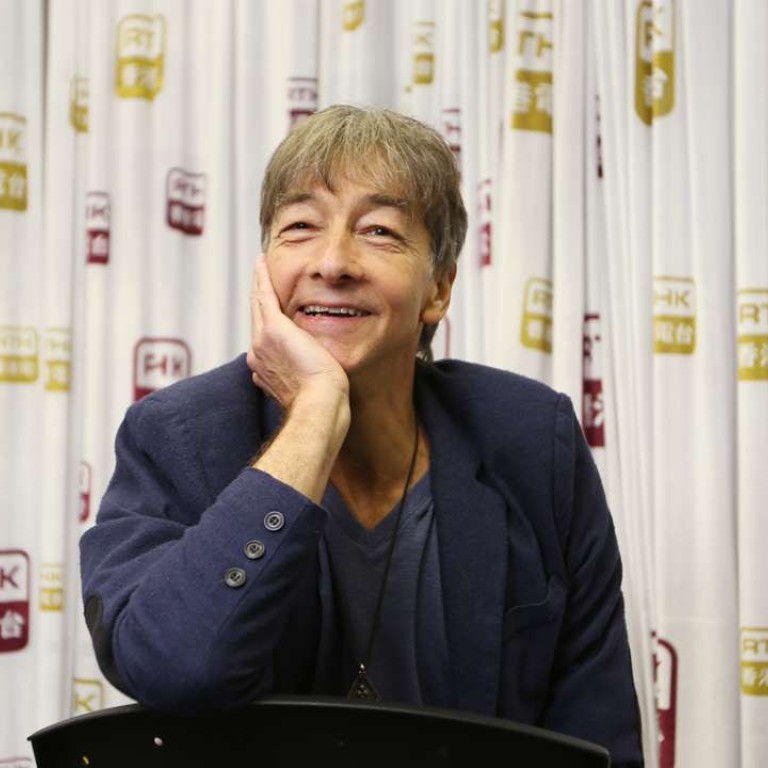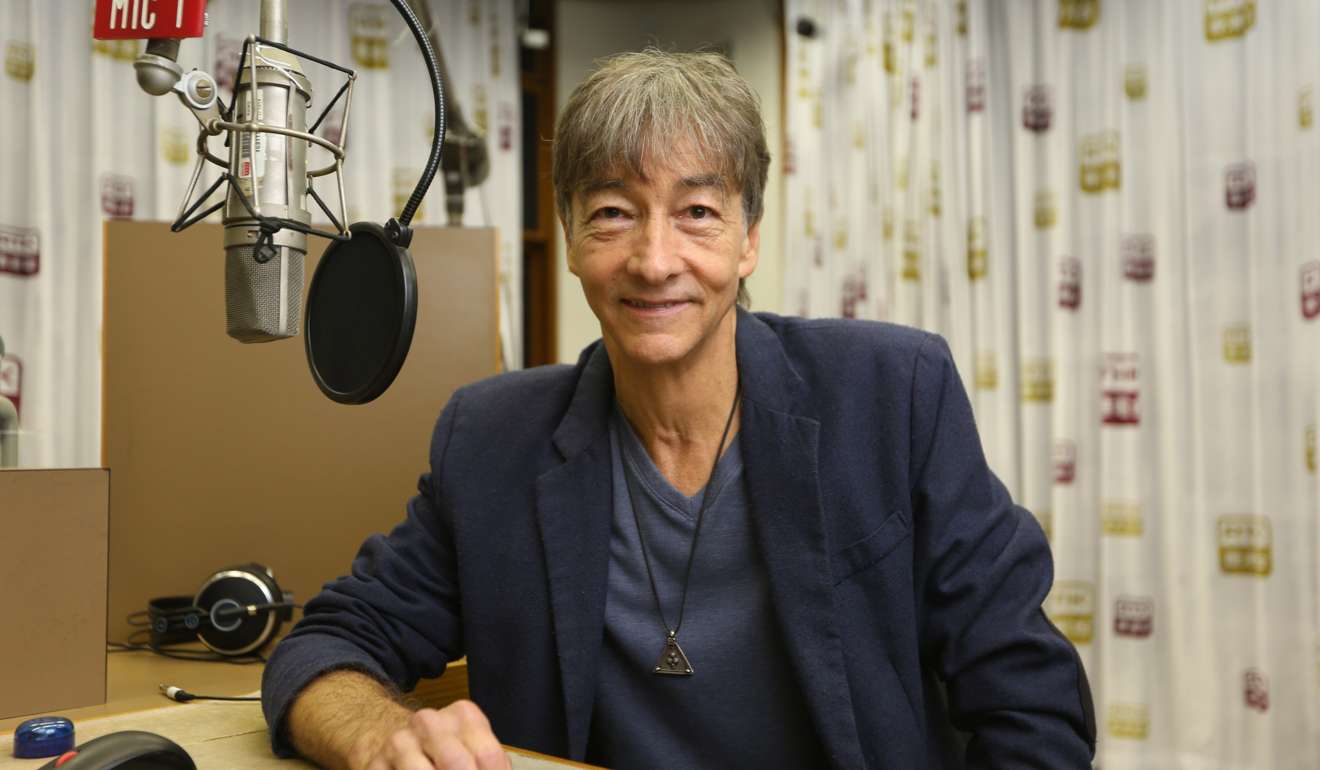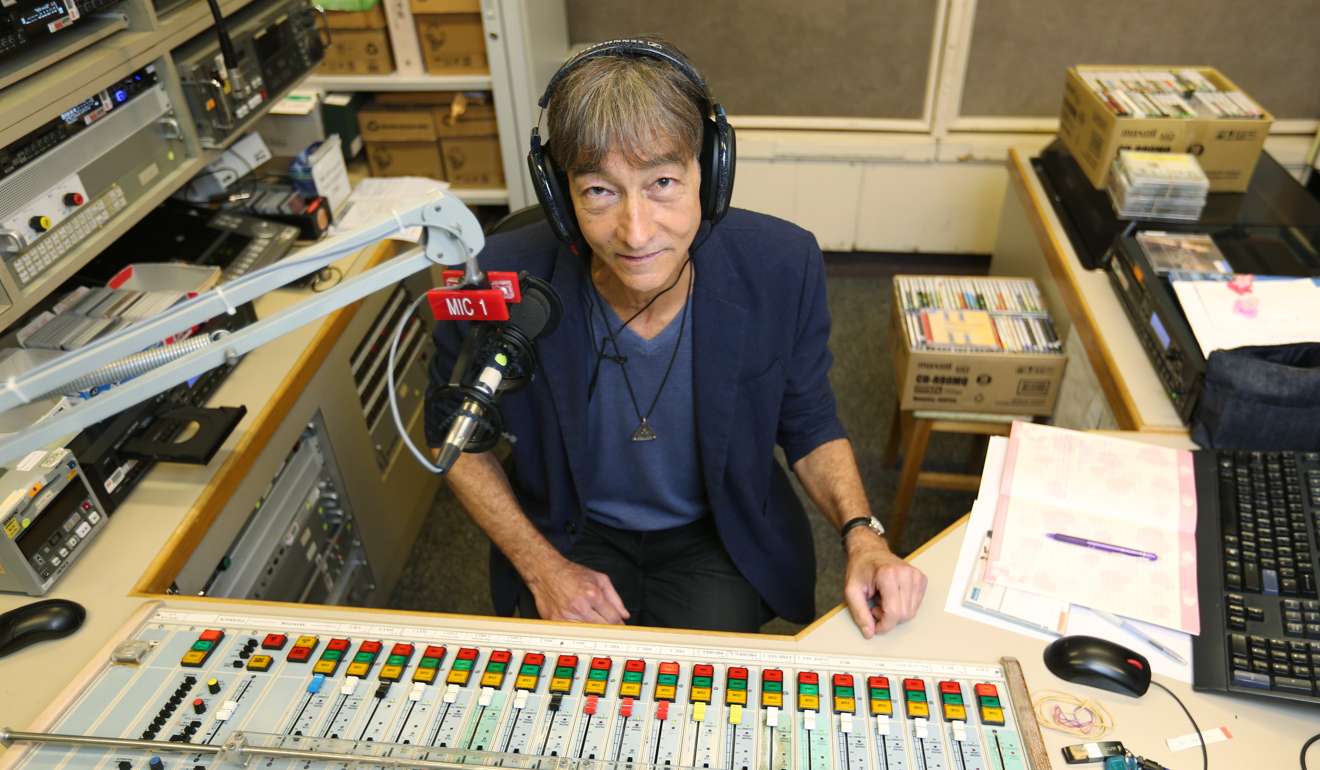
Hong Kong radio host Jonathan Douglas bows out after more than 30 years on the airwaves
He interviewed hundreds of the world’s finest musicians and artists, and now is considering a life of acting and travelling around Europe
The city will lose more than just a broadcaster when Jonathan Douglas goes off air on Monday. The Londoner, who is one of the last remaining British voices on RTHK, will go into retirement after three decades presenting classical music on Radio 4.
“I feel I am in denial,” the softly-spoken Briton says about leaving the station that he joined back in 1986.
Douglas, with a degree in English literature, many years as a stage actor and a piano composer, sees his years in Hong Kong as only his second act, with a third about to begin.
“I want to enrol in acting classes in London and learn to ride a motorbike to explore Europe,” he says.
Having hosted the Morning Call – a popular weekday show – for years, Douglas is used to conducting live interviews with artists.
Of the thousand or more discussions he has had with artists, which helped put Hong Kong on the world map of classical music, he says “98 per cent of them were brilliant”.
From top international artists to budding local musicians, many have shared their thoughts with the local radio personality while Hong Kong, China and the wider world has undergone rapid change.
For instance, former Soviet musicians, conductor Valery Gergiev and violinist Viktoria Mullova, spoke with Douglas in the aftermath of the Cold war. Chinese musicians, including composer Tan Dun and cellist Wang Jian, also appeared on his show long before they rose to international acclaim and China’s coming of age. Late maestros, such as Sir Neville Marriner, Lorin Maazel, Isaac Stern, Jean-Pierre Rampal, also had detailed discussions with the Hong Kong radio host.
“I have come to the conclusion that doing interviews is good for your health,” he wrote in his 2005 book about the top 30 artists he had spoken to.
Douglas’ superior ability to engage with artists may stem from the fact that he is one too. His original piano scores were born from things that moved or inspired him, such as the events of June 4, 1989, and the 2008 Sichuan earthquake. He was honoured in 2008 with an MBE from the Queen for, among other things, his piece titled An Elegy for a Sichuan Mother.
Though meeting the Queen was certainly one the proudest moments of his life, he looks back on his years in Hong Kong and says there were other, less glamourous, but equally as memorable times.
I just can’t imagine Shakespeare would have been able to write King Lear in Singapore.
What was Hong Kong like when you first came all those years ago?
There were many more British then. Edward Youde was the governor when I came. I was blown away by Hong Kong – when I first looked across the harbour from Tsim Sha Tsui to the island, with hills and mountains in the background and extraordinary gleaming buildings in front – I couldn’t believe anything like that existed in the world. In it, I found an extraordinary energy, benign but not dangerous. Before Hong Kong, I was in Singapore for one year. It’s cleaner and safer there, but I found it too regimented. I just can’t imagine Shakespeare would have been able to write King Lear in Singapore. As a British colony, Hong Kong was a land of opportunity for young graduates like me. Here, I found the little door that opened into the world of broadcasting.
How was RTHK Radio 4 run back then and how has it changed?
When I arrived, the station was transitioning from the old BBC style – including news reading, which I also used to do. It had become outdated. There was, I feel, an initiative to gear Radio 4 more towards the modern Hong Kong audience, away from its colonial past. I don’t think it was done with reference to the Sino-British Joint Declaration [of 1984] – it was a natural process. Douglas Gautier [then head of Radio 4] took the process to heart, introduced bilingual programmes and more local staff.

So With the changes at RTHK, were you given more space to explore other interests?
I was a bit of a tearaway in those days. Outside of the office, I wrote songs and sang Cantonese that my producer translated for me. I played on the synthesiser and recorded it in a studio with two backing singers. One of the songs, Mama-san, became a hit and was heard everywhere – shops, taxies, on both RTHK and Commercial Radio – and people danced to it in nightclubs. But suddenly it stopped. It seems the powers that be found the subject unedifying and there was disapproval of a full-time staff member taking outside work, even though I had asked permission from a deputy head, who was a Brit. But in those days people were practical rather than political, so no one took the ban as a violation of freedom of expression.
Did you feel any difference before and after the handover in 1997?
I love Hong Kong irrespective of the periods. I think it has retained a lot of special qualities. Starting from the 1980s and up to 1997, it was a golden era and people were very proud to be from Hong Kong. I think they still are. That civic pride is something amazing about this city. After 1997, my impression was “so far so good”. As for Radio 4, it’s apart from the more sensitive areas on other channels, such as Chinese language news and TV. But we still have to be careful about how we describe, say, Taipei’s orchestra.
Was that what you told the Queen when she asked you about Hong Kong in 2008?
“Has it changed?” is all she said. I feel now a bit sorry for my answer as I dodged the question a little bit. I said: “Well, your Majesty, Hong Kong is such a dynamic place that it changes every day.”
Do you think the queen liked your answer?
I think she probably didn’t. I’d rather think she felt I was being a smart aleck. She also asked me what I do. This was a difficult question as you can’t answer something very simple like “I build ships”. So I talked about my work at the radio and the interviews I do, but then I said to myself: “Oh God, she’d think I’m just a DJ, and how on earth are we giving this chap an MBE.” So I said: “I do Shakespeare and I do a lot of acting too, your Majesty.” And she said: “Oh, acting too?” and thrust out her royal hand. The conversation was over.
Would you say receiving the MBE from the Queen was your proudest moment?
I’ve got two more. One year, around Christmas time, I got profoundly unhappy due to personal reasons during my Morning Call programme. Afterwards, Radio 3 asked me to do a special phone-in, pretending I was Santa Claus taking calls from children on what gift they’d be getting or where my reindeer parked, etcetera. It was all “ho ho ho”, and I pulled it off. That, I think, was my proudest moment.
The other one was about a witness account of a genocide in Yugoslavia that I had read in a Sunday Post. I was in a state of shock and was upset to find out the BBC World Service was on regular schedule. So I picked up a pen and wrote a passionate letter, in which I repeatedly used the phrase that “it was the worst atrocity in Europe since the second world war”. I posted it to the BBC news editor. A week or ten days later, the phrase was heard in the news everywhere. I can’t be sure that was me, but I suspect it might have been.
Aside from receiving an MBE, why is it that 2008 was emotionally-charged for you?
In April that year, I went to Beijing to work on a documentary assignment. There I saw those huge road intersections and roundabouts, and all those Mercedes and BMWs, which would have been bicycles 20 years ago when I saw in Guangzhou with my father in the 1980s. I also went to Tiananmen Square and I just stood there, closed my eyes and imagined what it might have been like in 1989. I walked down that main thoroughfare, where the tanks approached. But then I also went to “The Egg”, next to the square, for a family concert on Sunday afternoon where the music of Bach was being played by a female Chinese conductor.
Shortly after my Beijing tour, I was making coffee in the kitchen one morning, and my wife read me a sad account from the Sichuan earthquake [in May]. It’s about a young mother who was trapped under the ruins, protecting her infant baby with her body. Before she expired, she left a message in her mobile phone: “If you survive, remember that I love you.” That’s what the rescuers found when they discovered her body, and the baby was fine. It’s the most moving thing I have ever heard in my life, and it still is. On hearing that, I sat at my piano and wrote an elegy to pay tribute to the Sichuan mother.
Later at a City Hall fundraising concert organised by Nancy Loo for local pianists, I was the only person who played my own piece of music.
How do you see Hong Kong progressing?
People sometimes are negative about Hong Kong these days. Things are going down, etcetera. But I think Hong Kong is at a pivotal stage in its relationship with China. At the same time though, it needs to preserve its individual identity. The situation is bound to give rise to tensions. Mainland China is clearly going through a kind of authoritarian resurgence, and this could potentially lead to a dangerous situation. Things need to be handled with care.

You’ve interviewed thousands of artists. Which one would you consider as the most interesting?
It might be the Russian violinist Viktoria Mullova, whom I spoke to shortly after she defected under risky circumstances. It was a new experience for me to speak to someone who was accustomed to being surrounded by fear. She seemed so paranoid that she was suspicious of my most innocent questions with replies such as “No, I don’t know, why do you ask”, as if she was being interrogated. A few years later when I interviewed her again, she was totally changed and became chatty.
Who would you want to interview but have not?
I would have loved to interview the the late Sir Michael Tippett, the cellist Rostropovich, the rock legend David Bowie and Mick Jagger.
What is the first thing you want to do after so many years of getting up early for the morning show?
I’m preparing for auditions at three different acting schools in London just five days after my last day at RTHK. If I do enrol in the one-year course, I will be with people young enough to be my daughters and sons.
Are we losing the only Queen’s English at Radio 4 with your departure?
Well, beggars can’t be choosers. This colonial style of British voice is presumably not our priority. If there is somebody brilliant from any English-speaking world, Australian, American, British, why not? Wouldn’t it be marvellous to have a Scottish accent host? Or someone with an Irish accent on Morning Call?

